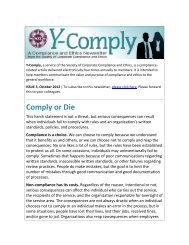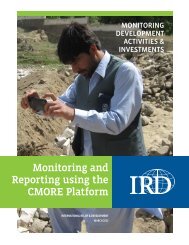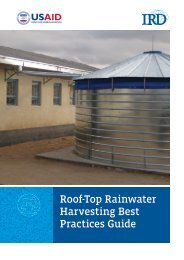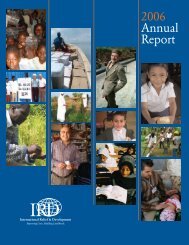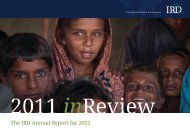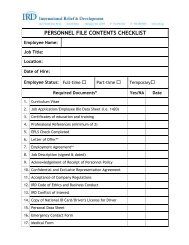Empowering citizens Engaging governments Rebuilding communities
Empowering citizens Engaging governments Rebuilding communities
Empowering citizens Engaging governments Rebuilding communities
You also want an ePaper? Increase the reach of your titles
YUMPU automatically turns print PDFs into web optimized ePapers that Google loves.
Foreword<br />
Recent civil stabilization successes can be traced to<br />
efforts launched in the Balkans in the 1990s. There,<br />
civil society groups became critical partners in sustaining<br />
and strengthening the peace. The communitybased<br />
model employed in that region is now being<br />
applied in other conflict and postconflict zones,<br />
including West Africa, Iraq, and Afghanistan.<br />
A fairly new development is that NGOs now cooperate<br />
and coordinate directly with US and international security<br />
forces, along with bilateral and multilateral donor<br />
agencies. In places like Iraq and Afghanistan, the<br />
coordination has been so close that the NGOs’ work<br />
has been viewed as examples of effective counterinsurgency.<br />
As military and civilian leaders have pointed<br />
out, civilian agencies are best equipped to understand<br />
and work directly with local <strong>communities</strong>, and they are<br />
generally better received by local <strong>governments</strong> and<br />
populations. While some development organizations<br />
say “civ-mil” partnerships would compromise their<br />
neutrality, beneficiaries recognize the consistency of<br />
such partnerships with the NGO community’s mission<br />
to assist the world’s vulnerable populations—even<br />
those caught in armed conflict.<br />
This publication explores the Community Stabilization<br />
Program (CSP) in Iraq, a successful civ-mil partnership.<br />
This cooperative agreement between USAID and<br />
IRD initially funded stabilization activities in Baghdad<br />
and then expanded nationwide. At the height of the<br />
program, IRD had 1,800 staff (more than 90 percent<br />
local employees) in 15 cities and was implementing<br />
$21 million a month in programming. Where CSP went,<br />
multiple USAID audits, military, and USAID experts say<br />
that stability tended to follow.<br />
from its Community Revitalization through Democratic<br />
Action (CRDA) program in the Balkans. IRD applied<br />
lessons about mobilizing war-weary populations to<br />
reestablish self-governance, community organization,<br />
and democratic principles. CSP benefited from IRD’s<br />
on-the-ground presence and record of success in Iraq,<br />
as well as the earned trust of local <strong>communities</strong>. The<br />
program supported basic training on principles of<br />
governance, promoted civil society institutions, and<br />
instituted a rapid participatory appraisal process to<br />
get projects moving quickly. With this capacity development,<br />
Iraqi community groups developed action<br />
plans and implemented them in coordination with the<br />
military and local provincial reconstruction teams as<br />
well as local ministry officials—helping legitimize the<br />
government and establish lines of trust and communication<br />
between leaders and <strong>citizens</strong>.<br />
This publication offers an unvarnished examination<br />
of CSP and its precursor program in Iraq—the<br />
approaches, challenges, results, and impacts. The<br />
story is told in the voice of the many people who<br />
implemented it as well as by the beneficiaries who<br />
appreciated its contributions to improving security,<br />
government services, and the quality of life in conflictaffected<br />
areas. In my view CSP provides evidence<br />
to support the assertion that social and economic<br />
development does help sustain peace and stability.<br />
Dr. Arthur B. Keys Jr.<br />
CSP relied on more than civ-mil partnership, however.<br />
The program also built on the experience IRD gained<br />
<br />
v


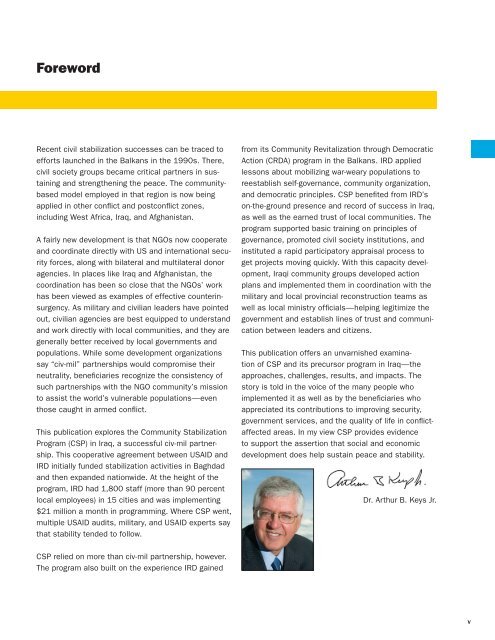
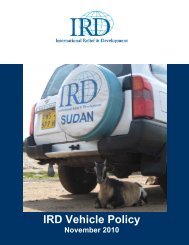
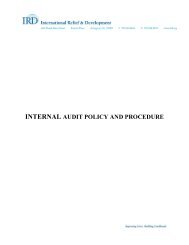
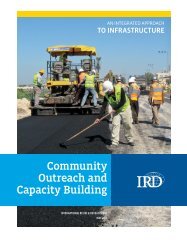
![Guide bonne pratique production d'oignon qualité_VF_4_2411012[1]](https://img.yumpu.com/23506639/1/184x260/guide-bonne-pratique-production-doignon-qualitac-vf-4-24110121.jpg?quality=85)

